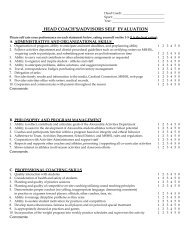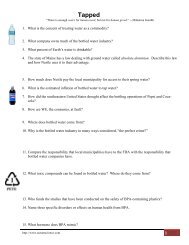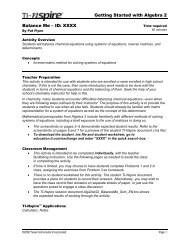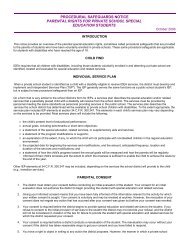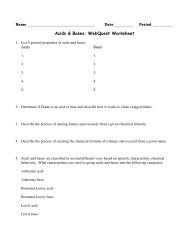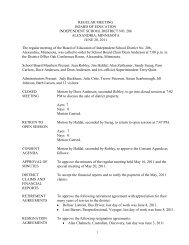Chapter 4 - Implementing a System of Research-based Interventions
Chapter 4 - Implementing a System of Research-based Interventions
Chapter 4 - Implementing a System of Research-based Interventions
You also want an ePaper? Increase the reach of your titles
YUMPU automatically turns print PDFs into web optimized ePapers that Google loves.
<strong>Chapter</strong> 4 <strong>Implementing</strong> a <strong>System</strong> <strong>of</strong> <strong>Research</strong>-Based <strong>Interventions</strong><br />
Resource Tool: Structuring a Dynamic Interview<br />
First inform parents: Explain that any information gained may be used as part <strong>of</strong> the<br />
system <strong>of</strong> SRBI process. Explain the system <strong>of</strong> SRBI process, if necessary. State all<br />
information is private and only specific information will be shared with staff if necessary.<br />
Convey any previously acquired data that the school has already collected including any<br />
graphs or samples <strong>of</strong> work from previous interventions. Accompany the process <strong>of</strong><br />
gathering information from parents with face-to-face or phone interviews. Mailing interview<br />
questions to parents without in-person interaction is strongly discouraged since parents<br />
may not understand questions or know what information is relevant to the pr<strong>of</strong>essional.<br />
Directions for the interviewer:<br />
Explain the purpose <strong>of</strong> the interview:<br />
A concern about (name area) has been expressed about how (name student) has been<br />
performing in school and we would like to gather information that will help the team<br />
determine how to intervene.<br />
1. This information may be used as part <strong>of</strong> a scientific research-<strong>based</strong><br />
interventions (SRBI) process. All the information is private and will be shared<br />
only with the staff that needs to know it.<br />
2. If an interpreter is being used for this process, a licensed school staff person<br />
must accompany the interpreter and conduct the actual interview.<br />
3. Interviews should be conducted in person, not over the phone, whenever<br />
possible.<br />
4. Ask the questions in the order they are listed.<br />
You may not be able to ask all the questions; however, in order to develop a<br />
rich developmental history <strong>of</strong> the student all questions should be asked.<br />
a. The primary reason for not asking a question is that the information is<br />
already on file.<br />
b. Another reason for not asking the question would be the age <strong>of</strong> the<br />
student. Older students or students who are already in the program<br />
would be a possible reason for some questions being no longer<br />
relevant.<br />
5. Be sure to check for understanding when asking the questions. Passive<br />
nodding may not indicate that the person being interviewed really understands<br />
the question being asked. You may need to give specific examples or rephrase<br />
questions to clarify.<br />
6. You may need to clarify for the parent that the individual student’s lack <strong>of</strong><br />
progress is not related to the school’s ability to meet adequate yearly progress<br />
(AYP).<br />
Minnesota Department <strong>of</strong> Education Draft 4-24



